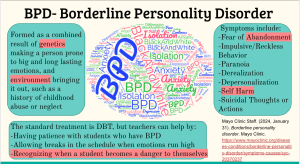
I debated writing this a lot. BPD is one of, if not the most, highly stigmatized illnesses, both physical and mental. However, I feel it will only enhance people’s understanding and acceptance of it if I tell my story, so I will. I have Borderline Personality Disorder, and it makes my day-to-day life very different from other people’s. I am often told I am being too dramatic, or that I am blowing things out of proportion. The truth of it is, I have very big feelings that go from 0 to 100 very quickly. My emotions come on faster than others, and it takes much longer for them to go away. Additionally, my emotions are often wildly larger than a situation warrants, making the feelings worse. Finally, I am more likely to act on my emotions impulsively than wait and think it out. I experience these symptoms mostly through anxiety and depression. I am grateful to have been enrolled in a Dialectical Behavioral Therapy course which taught me how to safely manage my symptoms and control them, rather than let them control me.
Some people experience the symptoms through anger, and that is part of the reason this illness is so stigmatized. Sometimes, people who suffer from this can have radical outbursts of anger, becoming a threat to themselves or others. While that is a reality of the disease, it is such a small percentage of people who experience it that way. We are called crazy, irrational, and violent for what makes up a very small minority of people. Most who have it have it the way I do, where the fear of abandonment is so great, it ends up pushing people away. Most suffer in silence, modulating their emotions to what may seem to others to be the “normal” amount, and as a result, end up repressing their emotions to a dangerous level.
70% of people living with BPD will attempt suicide in their lifetime. 10% will succeed (2024) Such a high stigma means people are less likely to seek out help and can fall victim to themselves. As a teacher, it is so important to know the warning signs of suicide. A big part of BPD is being impulsive; these decisions can happen quickly. Intervening at the right time can mean the difference between life and death.
Mayo Clinic Staff. (2024, January 31). Borderline personality disorder. Mayo Clinic. https://www.mayoclinic.org/diseases-conditions/borderline-personality-disorder/symptoms-causes/syc-20370237
NYP-bpd-borderline personality disorder (bpd)-understanding BPD: NYP. NewYork-Presbyterian. (2024). https://www.nyp.org/bpdresourcecenter/borderline-personality-disorder/understanding-bpd#:~:text=Research%20has%20shown%20approximately%2070,disorder%20and%20the%20general%20population
Hi Ann,
I really liked your blog post. I think you did an amazing job and I really liked the way you laid out everything. I also really liked that you marked up specific words/ sentences! It really helps the reader see this. Why do you think that anger plays a huge role with this disorder? Could it be that anger overpowers all other emotions? Also, I really liked the image you included. It does not just say the disorder but includes other emotions that this disorder can bring up. Lastly, when do you think it is the best time for a teacher to intervene? Maybe you could have added more about this. So that the reader can know when exactly it would be correct for someone or a teacher specifically to intervene. Other than that, you did an amazing job. I learned a lot more about this. I believe that this will also be helpful to other people who might not know much about this.
Hi Ann! I enjoyed your slide/ blog post for this week. Reading about your personal experience with BPD was very eye-opening and I learned a lot more about BPD than some knowledge I had before reading your post. I liked how you highlighted keywords and phrases on your slide so that I as the reader would pay close attention to key signs, symptoms, and ways to help any of our future students who may have BPD. What should we do as teachers if we notice that any of our students with BPD become a danger to themselves? No teacher wants to see their student suffer from this and it may be hard for a teacher to confront their student or even their parents about the behavior if they refuse to help their child. This can put a teacher in an uncomfortable situation, in which it may be hard to make the best decision. Including this in another post about BPD would help elevate your thoughts, as well as bring more awareness about BPD to those who do not know much about it.